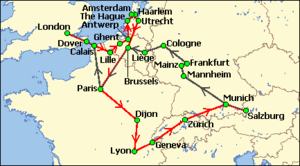
Back El gran viatge de la família Mozart Catalan Viaje de la familia Mozart Spanish Tournée européenne de la famille Mozart French Gran viaxe da familia Mozart Galician Viaggio in Europa della famiglia Mozart Italian モーツァルト家の大旅行 Japanese Grand tour van de Mozarts door Europa Dutch A grande viagem da família Mozart Portuguese Familjen Mozarts stora turné Swedish

The Mozart family grand tour was a journey through western Europe, undertaken by Leopold Mozart, his wife Anna Maria, and their children Maria Anna (Nannerl) and Wolfgang Theophilus (Wolferl) from 1763 to 1766. At the start of the tour the children were aged eleven and seven respectively. Their extraordinary skills had been demonstrated during a visit to Vienna in 1762, when they had played before the Empress Maria Theresa at the Imperial Court. Sensing the social and pecuniary opportunities that might accrue from a prolonged trip embracing the capitals and main cultural centres of Europe, Leopold obtained an extended leave of absence from his post as deputy Kapellmeister to the Prince-Archbishopric of Salzburg. Throughout the subsequent tour, the children's Wunderkind status was confirmed as their precocious performances consistently amazed and gratified their audiences.
The first stage of the tour's itinerary took the family, via Munich and Frankfurt, to Brussels and then on to Paris where they stayed for five months. They then departed for London, where during a stay of more than a year Wolfgang made the acquaintance of some of the leading musicians of the day, heard much music, and composed his first symphonies. The family then moved on to the Netherlands, where the schedule of performances was interrupted by the illnesses of both children, although Wolfgang continued to compose prolifically. The homeward phase incorporated a second stop in Paris and a trip through Switzerland, before the family's return to Salzburg in November 1766.
The material rewards of the tour, though reportedly substantial, did not transform the family's lifestyle, and Leopold continued in the Prince-Archbishop's service. However, the journey enabled the children to experience to the full the cosmopolitan musical world, and gave them an outstanding education. In Wolfgang's case this would continue through further journeys in the following six years, prior to his appointment by the Prince-Archbishop as a court musician.